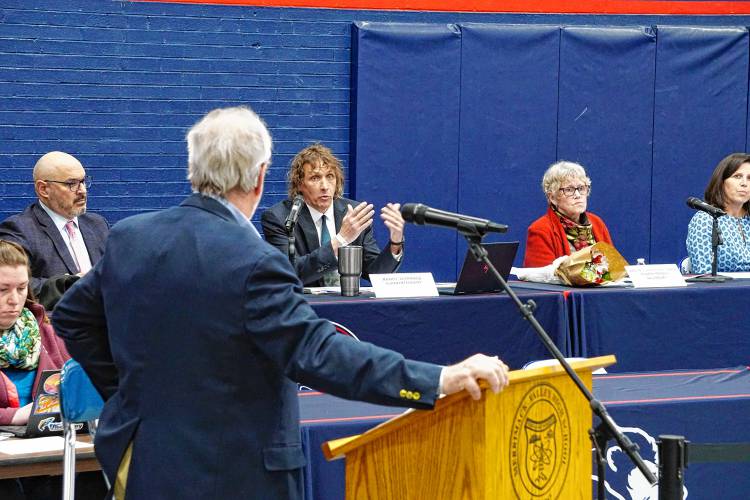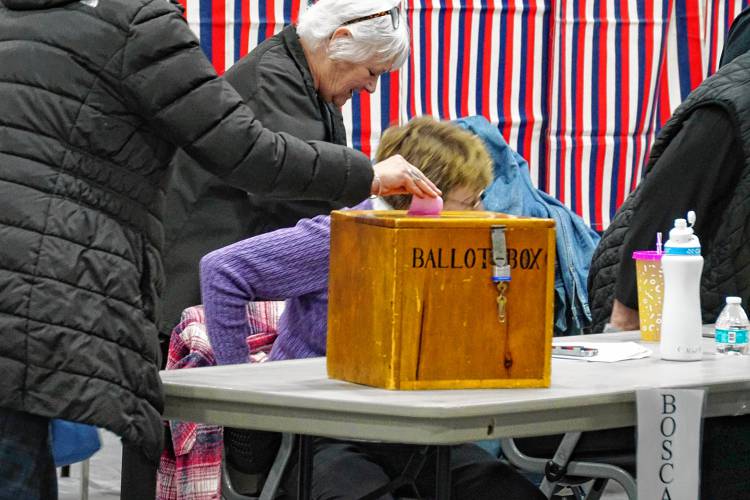Merrimack Valley voters approve $48.3 million budget, ask for more transparency
| Published: 03-09-2024 12:55 PM |
After the moderator read the results of the Merrimack Valley School Board elections Friday night, Julia Jones dabbed away a few tears.
Though she is the president of the Salisbury parent-teacher group, she relied only on word of mouth to promote her candidacy. She didn’t think she’d win, she said — and was “overjoyed” to be proved wrong.
“I am so happy that people of the community have faith and my back in what I can do,” Jones said.
By a decisive, 30-point margin, Jones had just won her race against Louise Andrus, 264 to 148. She is now the only new member on the board and succeeds outgoing chair Seelye Longnecker, who left her post after 11 years. It meant she would join her mother, Peggy Jones-Blanchard in representing Salisbury on the board.
In the other contested race on the ballot, incumbent Laura Vincent took 57% percent of the vote, fending off a challenge from Howard Pearl Jr. to represent Loudon, by a vote of 241-177. Incumbent Melissa Muzzey of Webster and moderator Charles Niebling were reelected in uncontested races.
The proposed $48,298,106 budget was passed in a 124-80 ballot vote. More than half of the nearly $2.7. million increase was due to rising costs for special education services.
Speaking in support, Amy Doolin said that part of the reason her family moved to Loudon seven years ago was so her son, who is hard of hearing, could access the services offered in Merrimack Valley.
“For us to have an actual teacher of the deaf and hard of hearing is not only educating my son, but also his teachers,” she said. “He is thriving here because of those services.”
Article continues after...
Yesterday's Most Read Articles
 Bill to allow ‘no fault’ evictions makes it to governor’s desk
Bill to allow ‘no fault’ evictions makes it to governor’s desk
 ‘He’s coming home’: Jury acquits former prison guard Matthew Millar in murder trial
‘He’s coming home’: Jury acquits former prison guard Matthew Millar in murder trial
 Look, up in the sky! It’s… an Airstream trailer?
Look, up in the sky! It’s… an Airstream trailer?
 Around Concord: Living in an 1856 schoolhouse is (mostly) delightful
Around Concord: Living in an 1856 schoolhouse is (mostly) delightful
 Slots and no bet limits: State budget shakes up New Hampshire’s casino landscape
Slots and no bet limits: State budget shakes up New Hampshire’s casino landscape
 ‘Deep flavor’ – New restaurant in downtown Concord offers creative spin on comfort food and cocktails
‘Deep flavor’ – New restaurant in downtown Concord offers creative spin on comfort food and cocktails
The tax impacts of this increase are expected to be felt differently by each of the district’s towns, with Boscawen seeing the biggest jump in its school tax rate, up almost 15% to $13.00. By comparison, Loudon saw an increase of just $0.21, or almost 2%, to $12.92.
Several residents remained disgruntled over a tuition contract with Andover approved at last year’s annual meeting. Going into effect this year, the contract will charge Andover $14,540 per student, 90% of the high school’s $16,155 standard per-pupil tuition. That lower rate is not a “discount,” school board members explained last year, when the contract came before voters. Andover pays less because it receives fewer services, paying for some of its own special education and transportation costs that are subtracted by the state, not the district, Superintendent Randy Wormald said Friday evening.
With the new contract, a 10-year agreement, taking effect this summer, voters Friday bristled at the lower tuition, wanting the tax relief that the more than $1,600 difference for each of Andover’s 68 high school students would provide, totaling about $100,000 a year.
The voters also passed a new collective bargaining agreement with the district’s administrators union in a voice vote.
While the public was asked to approve the costs of the new agreement, they were not privy to its full language. Webster resident Mike Jette said that he was unable to get a copy of the agreement he was being asked to fund.
The district’s lawyer responded that a written draft agreement could not be provided because it did not yet exist, as its proposed terms had been settled verbally.
“If there isn’t a document, then there’s nothing to share,” lawyer James O’Shaughnessy said. “The board does not have to create a tentative agreement because the community asks for one. They can — they don’t have to.”
This led, both before and after the vote, to calls for greater transparency by voters.
Under the portion of the warrant set aside for “other business,” fellow Webster resident Dave Collins warned the board that, while he trusted and supported them, not heeding pleas for more openness could mean turning away supporters they need to pass their budget.
“By just a margin of 44 votes your budget passed,” Collins said. Given the 124-80 vote, on top of low participation, that narrow of a margin should be a red flag to the board, he continued. “Those 80 people, if next year they decide to bring one or two of their friends, they’re going to vote your budget down. And I don’t think that’s what any of us want.”










 Celebrating independence: A list of local July 4 celebrations
Celebrating independence: A list of local July 4 celebrations Around Concord: Over The Moon Farmstead brings mead, beer, pizza and music to Pittsfield
Around Concord: Over The Moon Farmstead brings mead, beer, pizza and music to Pittsfield Around Concord: The Balshaws bring a rustic revival to the Canterbury Country Store
Around Concord: The Balshaws bring a rustic revival to the Canterbury Country Store
